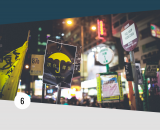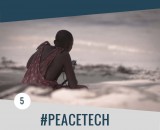A Local Woman with a Global Platform: Interview with Nobel Peace Prize Laureate Leymah Gbowee

Ms. Leymah Gbowee is a peace activist, trained social worker, and women’s rights activist who was a leader of the women’s peace movement that helped end the Liberian civil war in 2003. In 2011 she, Liberian president Ellen Johnson Sirleaf, and Yemeni activist Tawakkul Karman were jointly awarded the Nobel Peace Prize. Ms. Gbowee is the founder and president of the Gbowee Peace Foundation Africa. Building Peace editor-in-chief Jessica Berns interviewed Ms. Gbowee in October 2012.
What does peacebuilding mean to you? When did you first begin to see yourself as a peacebuilder?
Every human has the right to live, to express themselves, to worship the way they want to worship. An effective government is one that enables and empowers its citizens to contribute to their communities. When people are allowed to be part of every process that affects their lives, that is true peace, true freedom from fear and violence. My work is to ensure that no group is left out of making the decisions that affect their lives.
I first saw myself as a peacebuilder when I got involved in addressing community problems and others joined my efforts. I was very concerned about teen pregnancy and early sexual activity among the young girls in my community. My earliest and fondest memory of being a young peacebuilder is sitting with little girls talking about bodily integrity and the importance of education.
When did you first begin to see that your demonstrations were having an effect?
When we got endorsements from the churches—especially the archbishop of the Catholic Church, who was the heart of the country. Later on, he helped us raise money for our work. Another time was when we had a peace festival and the turnout was so great. At first we were not considered meaningful opposition to the Taylor administration and his allies, but when so many came to our festival, then attention turned to our efforts.
How does your work with girls connect to building peaceful and inclusive societies?
Girls are the first casualties of war through forced marriage, rape, sexual assault, and unplanned and forced pregnancy. They are barred access to school and to opportunities, among other realities that consort to restrict and eviscerate girls’ abilities to define their future. Peaceful and inclusive societies expand the arc of possibility for individuals and families.
“I am one representative of the thousands of Liberian women who stood with me in the rain, sat with me in the sun, and joined me in protest.”
What has been the effect of winning the Nobel Peace Prize on you? Your children and family? Your country? Africa?
I always say that I am a local girl with a global platform. The prize has led to the recognition that women play a pivotal role in peacebuilding at the grassroots level. Finally, our voice is recognized. I am one representative of the thousands of Liberian women who stood with me in the rain, sat with me in the sun, and joined me in protest. I am deeply protective of the mantle I carry on their behalf. One man didn’t start the war and one woman didn’t end it. The Nobel Prize is a celebration and recognition of Liberian women’s effort to end the war. The prize has provided me a global platform to broaden the conversation about war, peace, and stability. Women and girls have always been affected by war. The Nobel Peace Prize has helped all of our efforts to define true peace—one that is not only the absence of war but is inclusive of opportunity.
I have a young family, and my work and travels has certainly affected my children in positive and negative ways. The work has certainly increased but so have the possibilities; no award or recognition compares to being able to provide not just for their needs but also for their wants. My six children range in age from nineteen to three years old, and like many working mothers, I wish I had more hours in the day to be a fulltime activist and mother. It is not unusual to see me accompanied by my three-foot version of myself attending meetings and conferences. My older children, who once only knew a corner of Monrovia, have traveled internationally and recognize how much we have been blessed.
For Liberia, which has two Nobel laureates, the conversation about the country has changed. We are very talented people, and the civil war obscured how much we have to offer the world. It’s also shown how women’s groups all over Africa work together to pressure leaders for safer communities, greater representation in decision-making positions, cleaner water, greater access to education and jobs, and beyond. We have women’s groups in the West asking for our advice in how to organize and sustain focus.
“Liberia has given me a lot and the war took so much away.”
What are your aspirations for Liberia and specifically the girls and women of Liberia?
Liberia has given me a lot and the war took so much away. My hope is that girls and women never have to know the effects of war or the absence of peace in their lives—that they can invest in themselves because there is a future that will recognize their talents and provide an outlet for their contributions.
On different occasions we have heard you reference the importance of economic development work for Liberia. How do you feel that economic development and peacebuilding are related?
Liberia has a unique history. It was first colonized by former American slaves who gave us our country’s motto: “The love of liberty brought us here.” But that liberty was not extended to indigenous Liberians. Liberia has struggled to afford every citizen equal access to opportunities. With our diverse natural resources, the economic opportunities in Liberia are growing—as are the opportunities for economic and social tension. Peacebuilding requires stakeholders. When parents are able to provide for their families, when young people see that there is a future for their talents, then citizens have a stake in sustaining a peaceful society.
Nine years after the signing of the Peace Accord in Ghana, is reconciliation taking hold in Liberia?
At the community level, there are different things people are doing to build relationships and are doing so effectively. At the national level, reconciliation continues to be a difficult process to organize. One thing is the TRC [Truth and Reconciliation Commission of Liberia]. Some want the full report to be implemented, but that would require that some of our political leaders step aside—including our current president. So there is tension on what parts should be implemented and what parts should not be. In communities, people are happy to see civil actors take the lead but also disappointed that the process has yet to be depoliticized.
How is the country addressing the root causes of the conflict?
There are no shortages of small NGOs who have committed to promoting peace in the country. All over the country, there are small organizations working quietly with youth, holding town hall meetings, and planning events to ensure that Liberia does not falter in its march toward reconciliation. The government has many bodies and a few ministries entrusted with addressing the root causes of conflict. But private citizens are making their own determined strides, working in their local communities to address the causes of conflict.
Disappointingly, we have yet to identify the reasons why we fought. There have been no declarations of “this is the collective meaning of our reconciliation going forward.” When we talk about the root causes, everyone is tackling in their own view the causes of the civil war; however, the country still lacks a collective narrative.
What is your greatest concern for the world today? And your greatest hope?
Dealing with youth is a demographic nightmare but also a demographic dividend. In Liberia, half of our population is under thirty years old and many have no memory of war. But there are very few jobs in the formal sector, and tuition and school fees are very expensive, making education out of reach for too many. In the West, where the economy has slowed and governments have had to slash social budgets, the youth face rising university costs, fewer jobs for their skills, and low-paying jobs that cannot support a young family. Education must be connected to opportunities in the job market. Youth by nature are energetic and curious. It is up to us—the adults, the leaders in the public and private sector—to channel that energy and curiosity positively. In its absence, unrest and disillusionment conspire to weaken peace and security. The problem of youth unemployment is a destabilizing factor. But it is not all bleak. Youth breeds optimism. I work with many young people and their commitment to improvement is the greatest resource we cannot afford to squander.


If you want to hear more from Leymah Gbowee, watch her March 23, 2013 Distinguished Lecture Series talk at the Joan B. Kroc Institute for Peace & Justice, http://www.sandiego.edu/peacestudies/institutes/ipj/programs/distinguished_lecture_series.